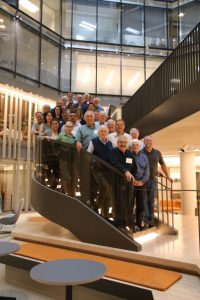Spring 2019 – GoMRI Synthesis & Legacy
– JUNE 19, 2019
(From Spring 2019 Newsletter) Contributing Author: Callan Yanoff
Synthesis and Legacy activities are fully underway as the Gulf of Mexico Research Initiative (GoMRI) continues to encapsulate and celebrate an entire decade of research. The interrelation of the eight Core Areas and their contributions to the GoMRI legacy were highlighted in the last issue of the GoMRI Quarterly Newsletter. The next set of Synthesis workshops and activities focus on bringing together knowledge and increasing understanding across all five of the GoMRI research themes.
Throughout the month of May, the Core Area 7B – Integrated/Linked Modeling System group focused their efforts on hosting a webinar series with the hope of developing a conceptual modeling framework that will synthesize new knowledge gained since the Deepwater Horizon oil spill. This framework will set the foundation for a model that can be used to address broad questions posed by stakeholders in the event of a future oil spill. To answer such questions, the model must be capable of integrating natural and anthropogenic systems at various disciplines and scales. This webinar series was held to gather information from the GoMRI research community. The recordings can be viewed on the GoMRI YouTube channel here as well as on the Synthesis and Legacy website.
To further document GoMRI’s scientific achievements, Synthesis workshops are being held on the following topics during the summer months:
- Fate of Oil and Weathering: Biological and Physical-chemical Degradation Workshop (Core Area 2) was held from June 12-14, 2019 in Washington, D.C. This multi-day workshop looked to synthesize findings and identify a unifying message across many Core Area 2 subtopics, specifically: analytical chemistry; use of genomics and proteomics; use of molecular biology tools to ascertain and measure response of marine organisms other than microbes; physical fate and natural processes; standardization of water-accommodated fractions (WAFs) and chemically-enhanced water-accommodated fractions (CEWAFs) methods; photochemical reactions at sea and on shoreline; microbial degradation in all sectors of the ecosystem; and marine oil snow sedimentation and flocculent accumulation (MOSSFA).
- Living on the Edge: Enhancing the Sustainability of Coupled Human-Environment Systems in the Gulf of Mexico Region Workshop (Core Area 5) will be held in Mobile, Alabama from July 10-12, The primary aim of this workshop is to help identify new ways to bridge the gaps that exist between science, policy, and people in Gulf Coast communities, fostering a collective understanding of the coupled human-environment systems that make up the terrestrial and aquatic edge of the Gulf of Mexico. Another goal is to address the challenge of translating science into knowledge that informs researchers, policy makers, local leaders, and residents of the Gulf Coast.
- Ecosystem Impacts of the Deepwater Horizon Event: Assembling the Record of Species and Community Change Workshop (Core Area 3) will be hosted in St. Petersburg, Florida from July 23-25, This three-day workshop has a desired objective of assembling a data time series for ecosystem components monitored in regions impacted by the Deepwater Horizon oil spill. Using information from these various sources, participants will assemble information and report on the extent to which population trajectories changed before and after the event. Time series data on contaminant concentrations, histopathological conditions, and other relevant information will be reviewed.
Please visit the Synthesis and Legacy website for more information, including a list of upcoming conferences and deadlines.







